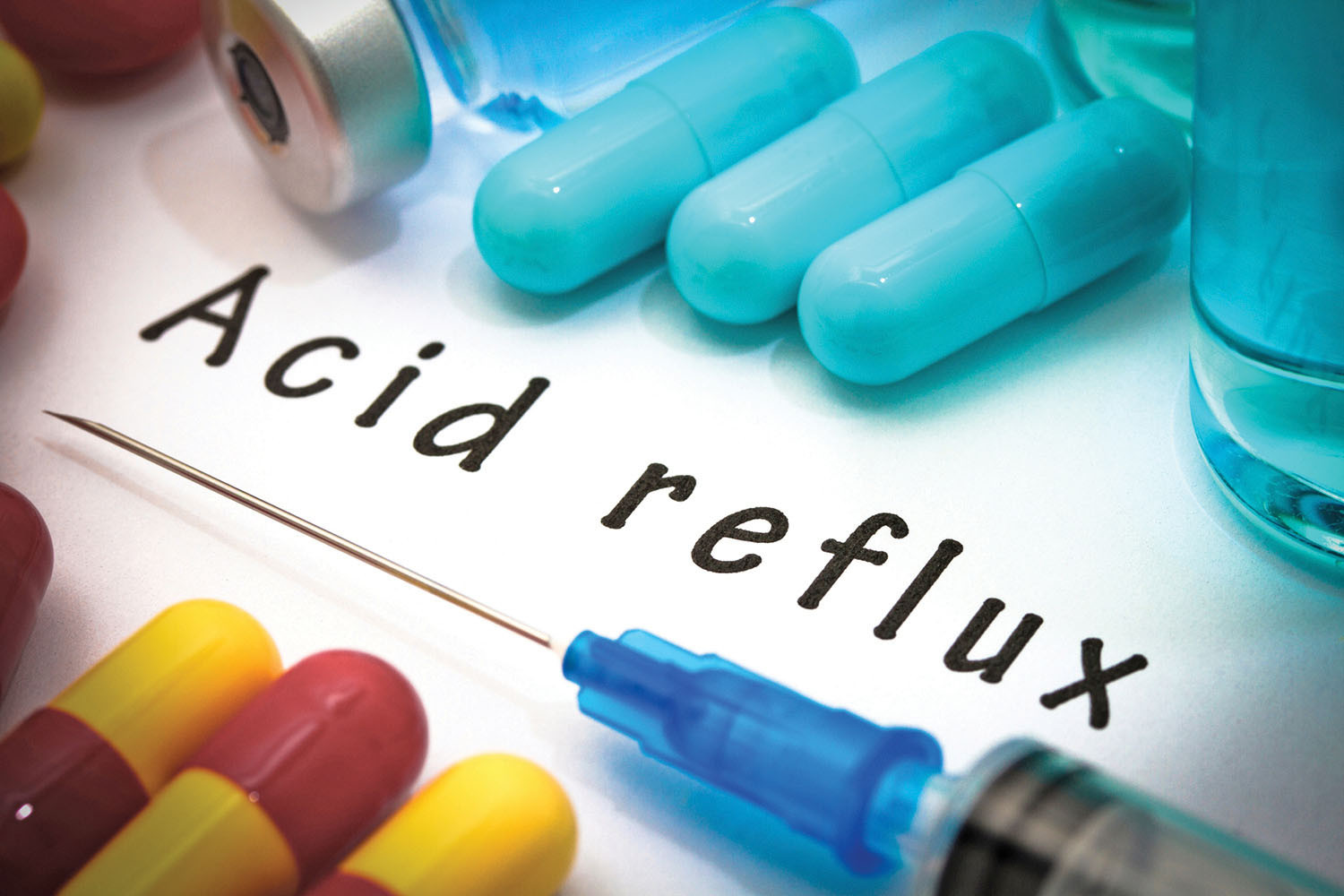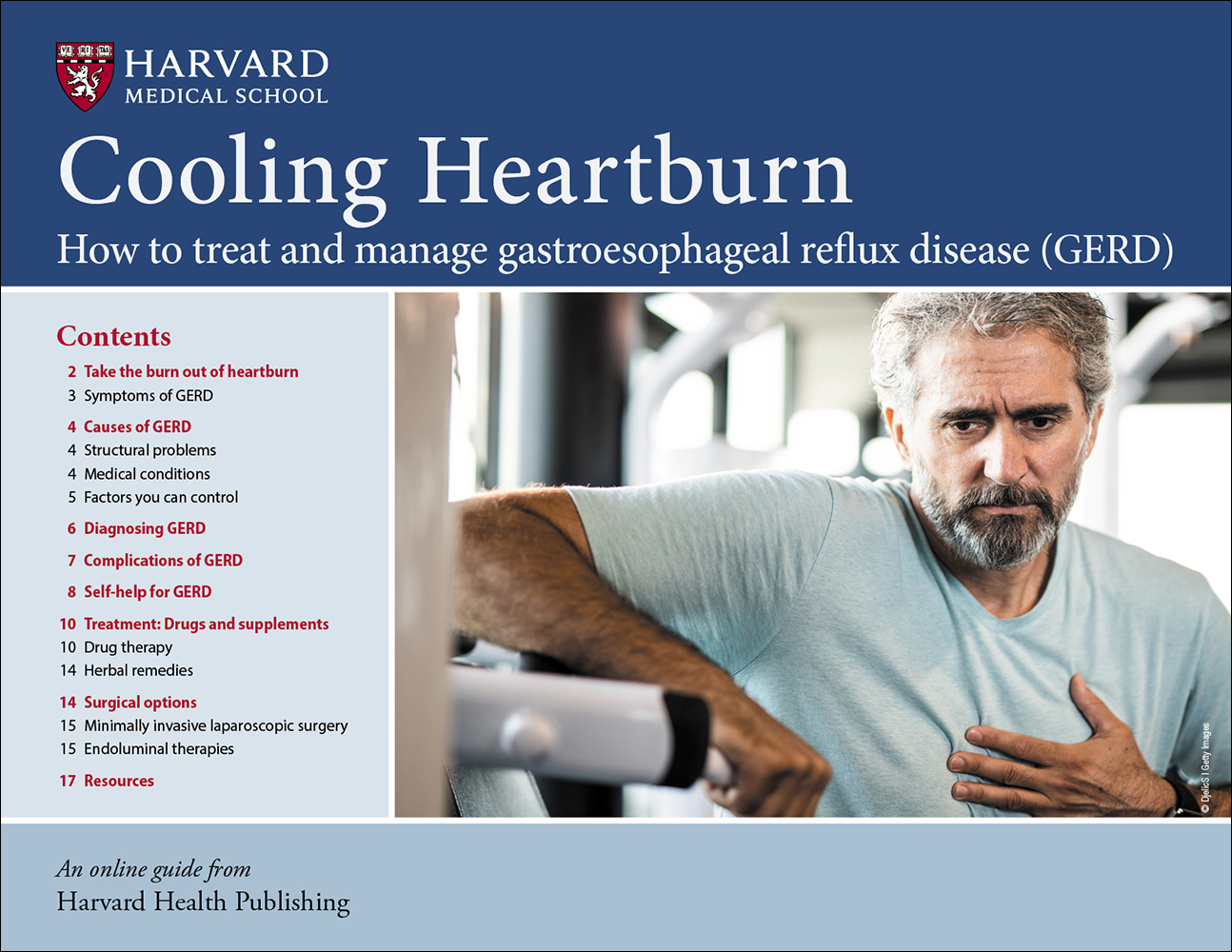Is it okay to use proton-pump inhibitors on demand?
It depends on your health and the frequency of symptoms, but it can be done in certain instances.
- Reviewed by Anthony L. Komaroff, MD, Editor in Chief, Harvard Health Letter; Editorial Advisory Board Member, Harvard Health Publishing

Proton-pump inhibitors (PPIs) are effective treatments for chronic heartburn caused by gastroesophageal reflux disease (GERD). Several, such as omeprazole (Prilosec, Zegerid), lansoprazole (Prevacid), and esomeprazole (Nexium), are available over the counter as well as by prescription.
But they don't rapidly relieve symptoms like two other classes of heartburn drugs — antacids and H2 blockers. That's important to understand when your doctor says you can take PPIs "on demand."
How do PPIs work?
PPIs stifle the production of stomach acid. This is important in GERD, which occurs when stomach acid and digestive enzymes squirt back up (reflux) into the esophagus, the tube that carries food from the mouth to the stomach.
The stomach juices irritate and inflame the esophagus lining, causing heartburn — a burning feeling in the chest — as well as a bitter taste in the mouth, difficulty swallowing, a sore throat, or coughing. Over time, GERD can cause permanent damage to the esophagus and increase the risk of esophageal cancer.
PPIs help by lowering stomach acid levels, which relieves heartburn and reduces the risk for esophageal damage.
Taking PPIs
A usual course of PPIs lasts two to eight weeks, depending on what your doctor prescribes. The drugs are taken once a day on an empty stomach, 30 to 60 minutes before breakfast. Your doctor might also recommend taking a PPI before a big meal.
But don't expect immediate relief. "You have to stick to the daily drug regimen and give it a few days to start working," says Dr. Kyle Staller, a gastroenterologist with Harvard-affiliated Massachusetts General Hospital. "You can help the process by avoiding foods and drinks that trigger your heartburn, not smoking, and not eating close to bedtime."
Are PPIs safe?You may have heard that proton-pump inhibitors (PPIs) are associated with dangerous side effects. In the past, small studies suggested that the drugs might reduce levels of vitamin B12, magnesium, and calcium and increase risks for hip fractures, pneumonia, kidney or cardiovascular disease, and dementia. However, large studies published in 2019 and 2020 found no links to such risks. "The new studies are more reliable and show no evidence of adverse outcomes, at least in a three-year period," says Dr. Kyle Staller, a gastroenterologist with Harvard-affiliated Massachusetts General Hospital. "But if you don't have any symptoms, and you don't have any damage in your esophagus due to heartburn, there's no reason to continue taking PPIs." |
After PPI therapy
Stopping PPI therapy gets tricky. Going cold turkey can lead to heartburn that's worse than it was before PPI therapy. "It's a rebound phenomenon," Dr. Staller says. "The PPI turns off the acid production, but when you stop the PPI, acid production gets turned back on suddenly, and that leads to symptoms."
To avoid a rebound, Dr. Staller advises a few strategies. "Taper off of PPIs slowly," he says. "If you're on a high dose, go to a lower dose for a few days. Then start an overlap period where you alternate a PPI one day and an H2 blocker the next." Examples of H2 blockers include famotidine (Pepcid) and cimetidine (Tagamet).
"After a week of overlap, stop the PPI altogether and take the H2 blocker each day for another week. Then stop the medications and see how you feel," Dr. Staller suggests.
What if symptoms return?
The way to treat recurring symptoms depends on the type of GERD you have. If GERD has damaged the lining of your esophagus, you'll likely need to stay on a long-term PPI regimen to reduce the risk for further damage and cancer. People who don't have such damage from GERD can use PPIs "on demand," according to guidelines from the American College of Gastroenterology, published in January 2022 in the American Journal of Gastroenterology.
While you might take H2 blockers to rapidly suppress GERD symptoms, just one or two at a time, that's not the way to use PPIs. "It's usually a two-week course," Dr. Staller says, "You probably won't need to taper off the drugs in this case, but you may need to experiment and see what works for you. If this round of PPIs treats your heartburn, you can go off of them again. If your symptoms persist, you may need to go back to long-term maintenance therapy with PPIs."
Image: © GreenApple78/Getty Images
About the Author

Heidi Godman, Executive Editor, Harvard Health Letter
About the Reviewer

Anthony L. Komaroff, MD, Editor in Chief, Harvard Health Letter; Editorial Advisory Board Member, Harvard Health Publishing
Disclaimer:
As a service to our readers, Harvard Health Publishing provides access to our library of archived content. Please note the date of last review or update on all articles.
No content on this site, regardless of date, should ever be used as a substitute for direct medical advice from your doctor or other qualified clinician.
















